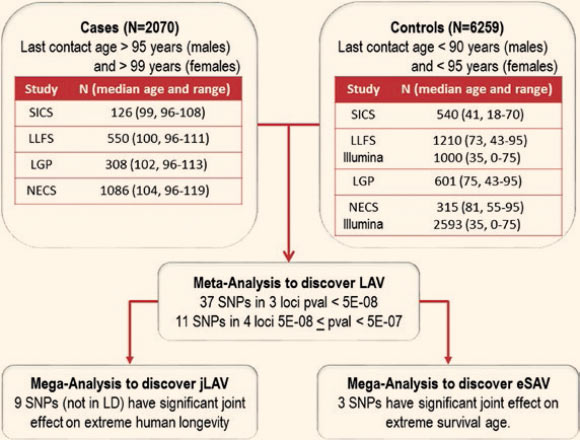An international team of researchers from the United States and Italy has identified new genetic variants associated with extreme survival and reduced risks for cardiovascular and Alzheimer’s diseases.

Schematic of the analyses conducted to discover longevity associated variants (LAV), LAV with significant joint effect on extreme longevity (jLAV), and LAV with effects on extreme survival age (eSAV). The top panels include description of the four studies (SICS – Southern Italian Centenarian Study, LLFS – Long Life Family Study, LGP – Longevity Gene Project, NECS – New England Centenarian Study) and additional controls from the Illumina repository. Image credit: Sebastiani et al, doi: 10.1093/gerona/glx027.
The team, led by Boston University Professor Paola Sebastiani, established a consortium of four studies of extreme longevity that contributed 2,070 individuals who survived to the oldest one percentile of survival for the 1900 U.S. birth year cohort.
“Out results highlight the importance of studying truly rare survival, to discover combinations of common and rare variants associated with extreme longevity and longer health span,” Prof. Sebastiani and co-authors said.
They conducted various analyses to discover longevity-associated variants, and to characterize those variants that differentiated survival to extreme age.
Their analysis identified new extreme longevity-promoting variants on chromosomes 4 and 7, while also confirming variants (single nucleotide polymorphisms, or SNPs) previously associated with longevity.
In addition, in two of the datasets where the scientists had age-of-onset data for age-related diseases, they found that certain longevity alleles also were significantly associated with reduced risks for cardiovascular disease and hypertension.
“The data and survival analysis provide support for the hypothesis that the genetic makeup of extreme longevity is based on a combination of common and rare variants, with common variants that create the background to survive to relatively common old ages (e.g. into the 80s and 90s), and specific combinations of uncommon and rare variants that add an additional survival advantage to even older ages,” the researchers said.
“However, while the ‘yield of discovery’ in the study was more substantial than in prior genome-wide association studies of extreme longevity, it remained disappointing, in that the two most significant genotypes discovered are carried by a very small proportion of the cases included in the analysis, meaning that much of the genetic variability around extreme lifespan remains unexplained.”
“We expect that many more uncommon genetic variants remain to be discovered through sequencing of centenarian samples,” they added.
“Larger sample sizes are needed to detect association of rare variants and, therefore, promising associations that miss the threshold for genome-wide significance are important to discuss.”
The findings were published recently in the online edition of the Journals of Gerontology: Biological Sciences.
_____
Paola Sebastiani et al. Four Genome-Wide Association Studies Identify New Extreme Longevity Variants. Journals of Gerontology: Biological Sciences, published online March 15, 2017; doi: 10.1093/gerona/glx027







